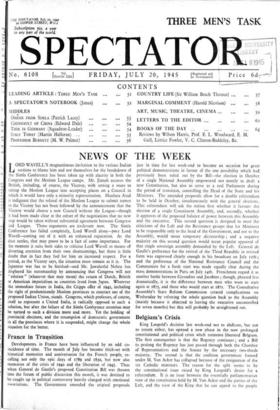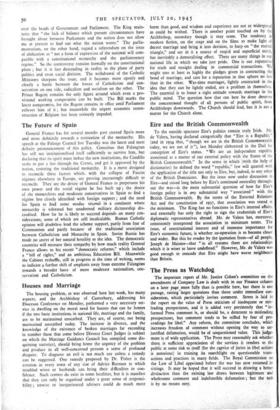Belgium's Crisis
King Leopold's decision last week-end not to abdicate, but not to return either, has opened a new phase in the now prolonged constitutional and political crisis whch torments liberated Belgium. The first consequence is that the Regency continues ; and a Bill to prolong the Regency has just passed through both the Chamber of Representatives and the Senate by the necessary two-thirds majority. The second is that the coalition government formed under M. Van Acker has collapsed because of the resignation of the six Catholic ministers. The reason for the split seems to be the constitutional issue raised by King Leopold's desire for a referendum. It is an issue between the essentially parliamentarian view of the constitution held by M. Van Acker and the parties of the Left, and the view of the King that he can appeal to the people
over the heads of Government and Parliament. The King main- tains that " the lack of balance which present circumstances have brought about between Parliament and the nation does not allow me at present to find out what the nation wants." The parlia- mentarians, on the other hand, regard a referendum on the issue of abdication as " not a form of express:on of the national will com- patible with a constitutional monarchy and the parliamentary regime." So the controversy remains formally on the constitutional plane ; but it is fast descending in reality to the plane of party politics and even social division. The withdrawal of the Catholic Ministers sharpens the issue, and it becomes more openly and clearly a battle between the forces of Catholicism and con- servatism on one side, radicalism and socialism on the other. The Prince Regent remains the only figure around which even a pro- visional working compromise can be built. The Bill marks the latest compromise, for the Regent remains in office until Parliament relieves him of it ; but meanwhile the urgent economic recon- struction of Belgium has been seriously impeded.



























 Previous page
Previous page